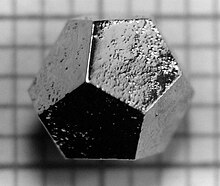A holmium–magnesium–zinc (Ho–Mg–Zn) quasicrystal is a quasicrystal made of an alloy of the three metals holmium, magnesium and zinc that has the shape of a regular dodecahedron, a Platonic solid with 12 five-sided faces.[1][2] Unlike the similar pyritohedron shape of some cubic-system crystals such as pyrite, this quasicrystal has faces that are true regular pentagons.

The crystal is part of the R–Mg–Zn family of crystals, where R=Y, Gd, Tb, Dy, Ho or Er. They were first discovered in 1994.[3] These form quasicrystals in the stoichiometry around R
9Mg
34Zn
57.[2] Magnetically, they form a spin glass at cryogenic temperatures.
While the experimental discovery of quasicrystals dates back to the 1980s, the relatively large, single grain nature of some Ho–Mg–Zn quasicrystals has made them a popular way to illustrate the concept.[4][5]
See also
editReferences
edit- ^ Canfield, Paul C.; Fisher, Ian R. (2001). "High-temperature solution growth of intermetallic single crystals and quasicrystals". Journal of Crystal Growth. 225 (2–4). Elsevier BV: 155–161. doi:10.1016/s0022-0248(01)00827-2. ISSN 0022-0248.
- ^ a b Fisher, I.R; Islam, Z; Zarestky, J; Stassis, C; Kramer, M.J; Goldman, A.I; Canfield, P.C (2000). "Magnetic properties of icosahedral R–Mg–Zn quasicrystals (R=Y, Tb, Dy, Ho and Er)". Journal of Alloys and Compounds. 303–304. Elsevier BV: 223–227. doi:10.1016/s0925-8388(00)00635-6. ISSN 0925-8388.
- ^ Tsai, A. P.; Niikura, A.; Inoue, A.; Masumoto, T.; Nishida, Y.; Tsuda, K.; Tanaka, M. (1994). "Highly ordered structure of icosahedral quasicrystals in Zn-Mg-RE (RE ≡ rare earth metals) systems". Philosophical Magazine Letters. 70 (3). Informa UK Limited: 169–175. doi:10.1080/09500839408240971. ISSN 0950-0839.
- ^ Daniel Oberhaus (2015-05-03). "Quasicrystals Are Nature's Impossible Matter". Vice. Retrieved 2020-06-07.
- ^ Aron Heller (2011-10-05). "Vindicated: Ridiculed Israeli scientist wins Nobel". The San Diego Union-Tribune. Retrieved 2020-06-07.